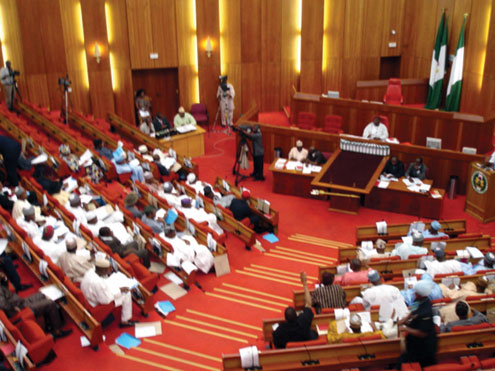We won’t interfere in banks’ mergers, acquisitions – CBN
BY Emma Ujah, Abuja Bureau Chief & Regina Otokpa
ABUJA — The Central Bank of Nigeria, CBN, said yesterday, that final decisions on Mergers and Acquisition, M&A, of banks rested with shareholders and that it would not interfere in the on-going process involving rescued banks.
This came as Afribank said, yesterday, it had signed a recapitalisation agreement with private equity consortium, Vine Capital, 18 months after being rescued in a Central Bank of Nigeria, CBN, bailout.
The apex bank’s Director of Banking Supervision, Mr. Sam Oni, made the clarification during a Bankers’ Committee press briefing in Abuja.
He was reacting to journalists’ questions on the implications of the rejection of acquisition moves by some shareholders who have approached the courts to stop such processes.
Shareholders of Intercontinental Bank Plc, Union Bank, Bank PHB, and those of Afribank have challenged in court, planned acquisitions of their banks by other investors.
Oni, however, said the CBN would only act as a “facilitator” and that as such the issue of imposing investors on any bank would not arise.
His words: “The bank has made it very clear from the beginning that CBN is actually playing the role of a facilitator. What CBN did was to appoint advisers to advise these banks. In terms implementing mergers and acquisition process, it is actually driven by the boards of those banks, talking to the managements of those banks and then the share holders.
“There has been no time that the CBN as a regulatory body has given an order or intervened in that process. However, what is going to happen is that when all of those agreements have been reached, they will need to seek approval from the CBN.
Afribank signs deal
Afribank said the deal with Vine Capital, a consortium of local and international firms, still needed shareholders and regulatory approval. It gave no financial details.
“The Memorandum of Understanding, MoU, provides a framework for the process by which the bank will be recapitalised,” Afribank said in a statement.
Afribank, whose shares rose 2.7 per cent, yesterday, has a market value of N25.6 billion ($165 million). Before the bailout, it was Nigeria’s seventh largest bank by assets but has since made significant writedowns. Its shares are 71 per cent free float, 28 per cent under asset management nominee accounts and 1 percent held by directors.
“And not only CBN but also SEC would be involved in terms of approving some of the transactions; so also the CAC will be involved, even the judiciary will be involved. So a lot of government agencies will be involved”.
In spite of the various court cases the CBN chief said that the bank had no doubts about smooth sailing transactions in the M&A process.
“I want to make it very clear that we do not anticipate any serious issues or disagreement among shareholders because all along, they shareholders have been carried along”, he said.
The director also said that the purchase of Non_Performing Loans, NPLs, by the Asset Management Company of Nigeria, AMCON, had brightened up the balance sheets of the nation’s banks. This he said has made them very attractive to investors.
According to him, at the end of the on_going second round of purchase of loans by the special purpose vehicle, NPLs ration in the banks could be as low as 5 per cent.
His words, “the first round of purchase of non_performing loans that was done by AMCON was restricted to merging lendings by intervened banks and the NPLs of those intervened banks but then limiting the purchase of the loans that it bought from the non_intervened banks to only merging loans.
“They have now gone round to purchase all non_performing loans from all the banks. By that exercise, the balance sheets of majority of the banks have been restructured; the quality of the balance sheets is quite good now and our target is that by the time this second round of exercise is concluded, the NPLs ratio of the industry should not exceed 5 per cent.
“We are trying to target even a lower rate than that because we are encouraging banks to charge all of those loans that have been fully provisioned because there is no point carrying those loans in their books.
“We have guidelines that for such write_offs, that after sometime, all of those loans that have been fully provided for will be written off and that will help them in terms of their balance sheets being very healthy and very competitive.
“That is a good development by kind of further de_risking the financial system and ensuring that financial system is stable and the confidence that has been restored will continue to propel that industry”.
Source : Vanquard








